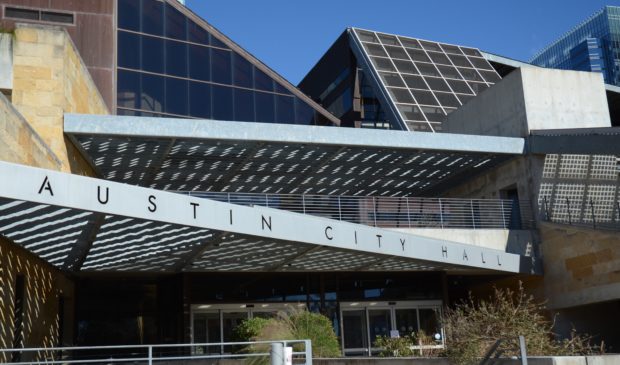Possible lobbying ordinance changes headed to Council
Monday, November 6, 2017 by
Chad Swiatecki The Ethics Review Commission approved a series of recommendations for how to amend the city’s Anti-Lobbying Ordinance, portions of which have been criticized as too vague or unfair by solid waste and other contractors who regularly do business with the city.
The recommendations on issues such as a no-contact period prior to selection of vendors and how to punish companies who violate the ordinance, appear to have shaped an amendment to the ordinance that City Council will consider at its meeting this Thursday. The recommendations, which were finalized by a stakeholder working group on Oct. 31, include the following changes:
- Barring communication with city representatives by vendors beginning four days after a request for proposals or other bid solicitation process is made public. This recommendation was approved 7-2, with commissioners Ben Stratmann and Mary Kahle opposing.
- Setting the no-communication period at 60 days or until the related contract is approved, whichever comes first. Approved 9-0
- A number of changes to enforcement of the ordinance, including how to carry out appeals for violations and the extent of punishment, including possible debarment from bidding on city contracts for three years. Approved 9-0
- Adding procedures provided by the American Bar Association, or other best practices, for how to enforce the ordinance. Approved 9-0
- Allowing the body that hears appeals of violations cases to consider mitigating factors – such as staff or Council members initiating contact during the no-contact period – in its rulings. Approved 9-0.
The ordinance and its possible revision is a timely issue because the city currently has an open bid for the removal and reuse of biosolid waste from the city’s water treatment plants. That ordinance was waived for the biosolids contract and proposals are due Nov. 7, two days before Council could vote on amending the ordinance.
Commission members heard from a battery of waste industry representatives and legal staff at Wednesday’s meeting, with arguments coming from both sides about the best way to prevent inappropriate communication that could sway staff or Council decisions.
Several representatives referred to the current non-communication policy as unclear, which would open vendors up to staff finding them in violation even if they were responding to a question from a city representative. Such violations and possible debarment were referred to as “a death penalty” for municipal contractors because those violations become public record and would make it difficult for companies to bid for contracts in other cities.
Another concern was that city staff and registered vendors typically have pre-bid discussions about how to best structure a request for proposal, with some alterations and adjustments coming from ongoing discussions after the solicitation is made public.
Steve Shannon, a district marketing manager for Waste Connections, said his company has sat out from bidding on city contracts because the anti-lobbying policy as presently written could find well-meaning operators in violation through the course of doing normal business.
“Until we get a fair and level playing field we’re not going to bid in Austin,” he said. “Right now there is no opportunity to challenge the RFP, but there is a time to ask questions and get things changed. The Anti-Lobbying Ordinance should start as soon as possible.”
Bob Gregory, owner and CEO of Texas Disposal Systems, said the current ordinance has prevented his company’s representatives from alerting city staff to certain “illegal acts” on the part of other vendors. TDS is the city’s largest waste hauler and has mounted some of the most vocal opposition to how the ordinance is currently structured and enforced.
“We’re very serious about the first amendment … and I hope you get us more specificity,” he said.
Photo by John Flynn.
The Austin Monitor’s work is made possible by donations from the community. Though our reporting covers donors from time to time, we are careful to keep business and editorial efforts separate while maintaining transparency. A complete list of donors is available here, and our code of ethics is explained here.
You're a community leader
And we’re honored you look to us for serious, in-depth news. You know a strong community needs local and dedicated watchdog reporting. We’re here for you and that won’t change. Now will you take the powerful next step and support our nonprofit news organization?



